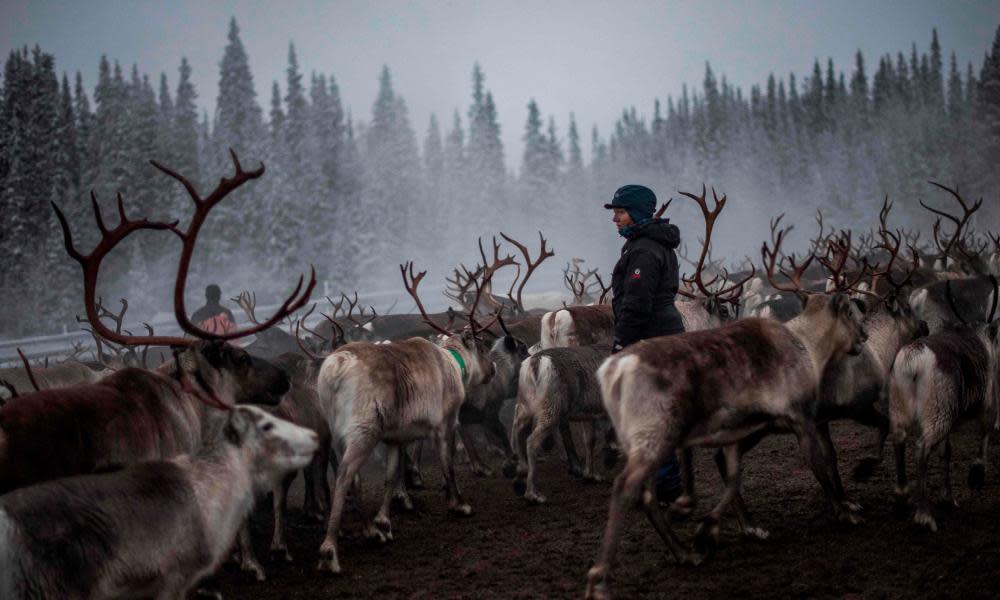Indigenous reindeer herders win hunting rights battle in Sweden

A group of indigenous reindeer herders has won a 30-year battle to take back exclusive rights to hunting and fishing across a swathe of Arctic Sweden, in an important ruling for the Sami people’s struggle to control their ancestral land.
Sweden’s supreme court ruled on Thursday that hunting rights lost in 1993 should be restored to Girjas Sameby, a Sami “village” or “district” whose herders graze reindeer over a 19-mile (30km) strip of land, stretching from the Norwegian border towards the Baltic Sea.
Related: Norwegian herder ordered to put down dozens of reindeer in controversial cull
“This is a historic victory that strengthens our rights over our traditional lands,” Matti Blind-Berg, the district’s chairman, told the Guardian. “This is a blow for the Swedish state, which will hopefully mean they have to respect Sami rights.”
The Sami, who speak a group of languages related to Finnish, have herded reindeer across northern Scandinavia and on Russia’s Kola peninsula for thousands of years.
The five judges ruled unanimously that rights stemming from the Sami’s historical use of the territory superseded more recent rights granted by the Swedish state and its agencies.
“The supreme court determines that Girjas Sami district has the sole right to decide on small game hunting and fishing in this area,” Sten Andersson, one of the judges said.
The 10-year court case was marred by anger over government lawyers’ use of the word “Lapp” – which many Sami consider offensive and colonialist – in the district and high courts.
The ethnic group has suffered discrimination by the Swedish state, with the Institute for Race Biology from 1922 carrying out humiliating physical examinations of Sámi men, women and children, and Sami children in the 1930s forcibly taken from the parents, sent to boarding schools and banned from speaking their languages.
Girjas Sameby began its legal action against the Swedish state in 2009, six years after a new hunting law gave individual landowners the right to decide on small game hunting and fishing rights on their properties, leading to a significant increase in hunting over the territory.
“This became a massive threat to reindeer husbandry. Hunting and fishing became a disturbing and damagaing factor,” Peter Danowsky, the lawyer who has represented the district since it began preparing the case in 2007, told the Guardian.
The district won its case in Gällivare district and high courts, only for the Swedish state to appeal each time.
In its final ruling, the supreme court cited historical evidence showing that by the middle of the 18th century individual Sámis had established exclusive rights over small game hunting and fishing in their territories.
“Our investigation shows that the Swedish crown, when it began to encourage the colonization of Lapland, was careful to safeguard the Samis’ opportunities for hunting and fishing,” the judges wrote in the judgment.
“And the hunting and fishing rights that the Sami in the area had at the time of the 1886 law and the following reindeer grazing laws have been transferred to members of the Sami district today.”
Danowsky said the ruling extended the legal concept of “prescription from time immemorial”, setting a precedent for other cases in Sweden and internationally.
It was the first time the concept, which bestows a right to property or land use through historical precedent, had been applied in Sweden, he said, “regardless of the fact that the area of land is very vast and the population is very sparse.
“The fact that the court recognises this right, which is a kind of property right ... is significant, it’s new. It is quite dramatic, and it is a judgment that could have implications also for other the rights of indigenous peoples. It wouldn’t surprise me if this judgment was also used in other countries.”

 Yahoo News
Yahoo News 
